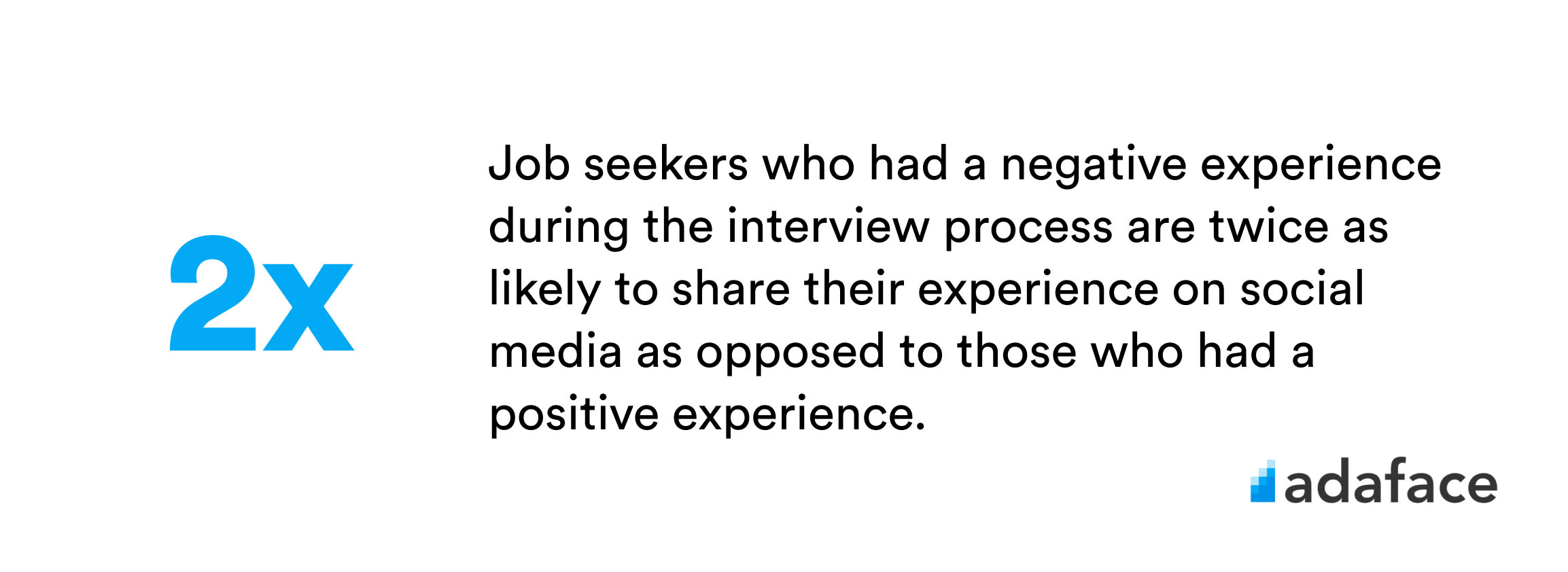Crafting the Perfect Candidate Experience: A Framework for Success
Revolutionize your hiring game with the ultimate guide to crafting the perfect candidate experience. Check out the post to unlock the secret to success!


Great candidate experience is like going on a first date – you always want to make a positive and lasting impression.
Consider this scenario – after the date ends, you realize that you are not a good fit for each other. You definitely don’t want your date to tell all their friends how you turned up late and spent all the time just talking about yourself. You still want to make a good impression on your date, so the possibility of them setting you up with someone they know is still open.
Similarly, great candidate experience is all about ensuring that even your rejected candidates still recommend your company to others.
Why is candidate experience important?
From how your recruiters communicate with candidates to how quickly they respond, all the way down to how they offer feedback, candidate experience makes a huge difference.
Attracting top talent
A positive candidate experience can help attract top talent to your organization. If candidates have a good experience throughout the recruitment process, they are more likely to recommend your organization to others which increases the possibility of hiring top talent.
Building your employer brand
Providing a great candidate experience can help build your employer brand and improve your organization's reputation. This is key to the success of your business.
Improving productivity
Providing a streamlined and efficient recruitment process can also improve productivity. When the process is well-organized and effective, HR staff can spend less time on administrative tasks and more time on strategic planning and other important responsibilities.
Retaining employees
A positive candidate experience can also improve employee retention. When employees feel valued and respected from the beginning of their employment, they are more likely to stay with the company long-term.
These positive outcomes can occur from having a great candidate experience. While positive experiences attract, negative experiences make us take extra care when it comes to most situations. Here is a statistic that showcases what happens if your candidates constantly have negative experiences during recruiting.

Source: Adaface
Well, it's completely evident how important candidate experience is for your company. But what exactly does it entail and how do you achieve this? Let's explore these in the next sections.
What makes for an effective candidate experience?
When it comes to candidate experience, the goal should always be to craft an enjoyable, positive and informative journey for them. This means taking the time to make each stage of the process as smooth and efficient as possible, while also ensuring that candidates gain an understanding of what it is like to work with you.
So what makes a great candidate experience? You need to check these 4 boxes:
- Clear expectations for all participants
- Thoughtful and timely communication
- Access to information about role, team and company
- Great interview experience
By making sure these four pillars are built in your recruitment process, you can ensure that everyone who interacts with your company leaves with a great experience – even if they don't end up becoming an employee!
Clear expectations for all participants
There are different participants in a recruiting process - candidates, HR folk and interviewers and so on. Each participant in the process must be made aware of what is expected of them. But how do we achieve this?
- For candidates: You can set clear expectations by having clear job descriptions. A detailed and accurate job description includes information about the role, required qualifications and experience, responsibilities, and other relevant details. By providing a clear job description, candidates can better understand what is expected of them.
- For interviewers: Having standardized interview questions and consistent evaluation criteria can ensure a fair and consistent recruitment process for the position. This ensures that all candidates are evaluated based on the same criteria.
When everyone knows what is expected of them, it can lead to more effective communication and fewer misunderstandings, ultimately leading to a better candidate experience.
Thoughtful and timely communication
Thoughtful and timely communication means ensuring that communication throughout your recruiting process is clear, consistent, and timely. It means reaching out to candidates at every stage in ways that make them feel valued and informed. Here is how you can streamline and make communication feel effortless for your organization:
- Email templates: This can help HR staff and interviewers save time and ensure they provide candidates with all the necessary information clearly and concisely. Organizations can create templates for scheduling interviews, sending recruitment process updates, and providing candidates feedback.
- Personalized communication: Organizations should aim to personalize their communication with candidates as much as possible. This can help candidates feel valued and respected and contribute to a more positive candidate experience.
- Candidate feedback: Most companies ask for feedback from their users regarding the product or services they offer. Candidates want the same for them. In fact, according to recent statistics, 94% of candidates want to receive interview feedback, but only 41% have received interview feedback before. Thus, providing candidates feedback on their performance in the recruitment process improves the candidate experience and sets them up for success in future interviews.
Additionally, thoughtful communication mainly involves prioritising conversations which makes employees and candidates feel welcome and comfortable. For example, the Founder and CEO of Credit Karma, Kenneth Lin, has this to say about new employees:
"I want new employees to feel like this is a mission we're all in together. An open-door policy sets the tone for this. Whenever I'm in my office and available, I encourage anyone to come by and share their thoughts about how they feel Credit Karma is doing."
This manner of communication, especially from team members in top management positions, can do wonders for improving communication.
Access to information about role, team and company
Did you know that nearly 50% of candidates fail interviews because they lacked knowledge about the company or the job they wanted?
Providing candidates with access to information about the role, team, and company is essential to creating a positive candidate experience during the recruitment process. Here are a couple of ways you can achieve this:
- Company website: A dedicated "About Us" or "Our Story" page can provide candidates with an overview of the company's history and background, as well as its mission and values. Additionally, a "Team" page can give candidates an idea of your company's structure and introduce them to some of the key people they may be working with if hired.
- Blog posts and social media: Regular blog posts and social media updates can provide candidates with a more detailed and personal insight into your company's culture and values. These can include interviews with team members, profiles of company events, and updates on the company's latest projects and initiatives.
For example, Discord has a popular recruitment video showcasing the company's employees, culture, even the quirky keyboards that team members use. This can be a fun way of making candidates understand what it is like to work at your company.
Great interview experience
A great interview experience is critical to a positive candidate experience during the recruitment process. The foundation of a great interview experience begins and ends with structured interviews. A structured and well-planned interview across stages, whether a technical round or an interview to gauge cultural fit, goes a long way.
Using a structured interview format can help ensure that candidates are asked relevant and consistent questions and evaluated fairly and objectively. This involves creating a standardized set of questions and evaluation criteria for all candidates.
One must also remember structured interviews are not accomplished purely by having a well-planned interview in the final round. Structured interviews include structure across stages, whether an interview or a test you want to administer to gauge the candidate's skill set.
Bringing structure into the initial stages is an important factor you must keep in mind, and this can be done through pre-employment tests. Pre-employment tests, like the ones at Adaface, help keep the testing to a standard across all candidates. It helps reduce bias and allows you to use a consistent scoring approach, bringing more system to your hiring process.
Measuring the success of your candidate experience framework
You must find ways to measure the success or failure of any of these four main pillars we have explored.
Figuring out whether your candidate experience framework is working requires careful measurement. You need to track your program's success over time to ensure it delivers the desired outcomes.
Here are some of the best ways to measure your success:
- Surveys: Companies can use surveys to gather feedback from candidates about their experience during the recruitment process. These surveys can be conducted after specific touchpoints, such as after an onsite interview. In the beginning, we mentioned that you attribute great candidate experience to the fact that even rejected candidates recommend your company to others. Including this question, "How likely are you to recommend this company to others?" can give you a direct insight into the candidate's experience.
- ATS data: Applicant tracking systems (ATS) can provide data on key metrics such as time-to-hire, candidate conversion rates, and candidate engagement. This data can help companies understand how long it takes to fill positions, how many candidates are moving through the hiring process, and where candidates are dropping off.
- Feedback from recruiters: Hiring managers and recruiters can provide feedback on the quality of candidates, the effectiveness of the recruitment process, and the overall candidate experience.
- Social media and review sites: Companies can monitor social media and review sites for feedback from candidates about their experience. This feedback can help identify areas for improvement and provide insight into how candidates perceive the company.
These methods can provide key insights into how effective your candidate experience strategy has been. If you see positive results, you know your framework is on the right track. On the other hand, if results are lagging or feedback isn't overly positive, it might be time to reassess your strategy and make changes if necessary.
On a final note
With an optimized candidate experience, you can create a process that will attract talented applicants and foster a positive relationship with them before they even become employees. By putting the applicant's needs first and creating a streamlined process, you can provide a great experience that makes them more likely to accept your job offer.
Candidate experience is a dynamic process, and it's important to review and evaluate your approaches continually. By collecting feedback from applicants, you can make sure you're improving and continuing to offer the best experience possible.
Now that you have all the tools needed to achieve the best candidate experience, why not begin crafting it immediately?

